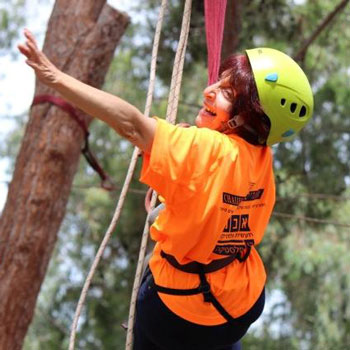Bosmat Nakash and her family immigrated to Israel from Iraq just before the Six Day War. Among the changes she experienced in her new country was a more tolerant attitude toward her disability.
During pregnancy, Bosmat’s mother took medication later linked to severe birth defects, and Bosmat was born disabled. But with the support of her loving family, Basmat graduated high school, earned a BA in Middle East and African Studies from Tel Aviv University, and climbed the ladder at the Bezeq Telecommunications Company from clerk to unit head.

Bosmat Nakash
In her retirement, Bosmat began what she calls “chapter two” of her life.
Bosmat is a participant of the fourth round of a pioneering course that has launched her on a new career path, enabled her to become proactive about her needs – and the needs of those in her community – and has widened her horizons. Most of all, it changed the way she sees herself.
The course, a joint initiative of SHATIL and the David Yellin College of Education, brings together physically, emotionally, or mentally disabled people and special education students, and trains them to become activists. The sixth round of the course began this month.
Bosmat says none of the changes she experienced would have been possible without one fundamental shift: Her awareness of her own relationship to her disability changed. “The course was extraordinary,” she said. “It was experiential and it touched me deeply.
“In the course, we had guest speakers every session and I learned from their successes,” she said. “Abbas Abbas, a blind man who founded an NGO to help other blind Arab Israelis, left a very strong impression on me. He said he had been in denial for years about his disability but then used this denial as a springboard for action. I was inspired. I realized I too had been in denial — but had been unaware of it. The course taught me to accept myself as I am. It’s a simple but profound change.”
“One of the main goals of the course is to develop an initiative that will help others. One day, three of us women were sitting together and one wrote the acronym of our three names and it came out: ‘husband.’ It clicked! We decided to develop a workshop about couple relationships for men and women with disabilities. The course facilitators helped us develop a work plan and we hope to soon begin a pilot.
“The idea for the couples relationships workshop came out of my own need. I’m 58 and I still have not found a partner in life. We know there is much need and demand for something like this.”
Meanwhile, Bosmat is continuing to work on this initiative through “A Home for the Social Entrepreneur,” set up by David Yellin for course graduates to continue the work begun during the course. Through the Home, Bosmat met social worker Nirit Rimon, who was working on initiating the same social change and disabilities course at Sapir Academic College in Sderot. Impressed with what she saw, Nirit offered Bosmat a paid position as co-facilitator of the new course – a step in a new professional direction for Bosmat.
“It was an extraordinary experience.” says Bosmat at the end of the first year of the Sapir course. “We had 22 participants – 11 social work students and 11 people with special needs – and four initiatives came out of the course. Five participants are working on an initiative called “To see the Person,” aimed at getting employers to see an individual job applicant beyond his or her disability. They plan to accomplish this through a documentary film to be produced by Sapir College film students.
“I was happy to participate in leading this course because the subject – changing society’s perception of the disabled person — is so important. Accessibility is not just about ramps. It’s accessibility to life. And if it begins in the colleges, it will seep into the general population. I have no doubt that just like physical accessibility, this will catch on everywhere.”
